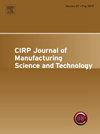Towards digital twin-enhanced control policies: A knowledge-based classification of release and dispatching policies in manufacturing systems
IF 5.4
2区 工程技术
Q2 ENGINEERING, MANUFACTURING
CIRP Journal of Manufacturing Science and Technology
Pub Date : 2025-10-10
DOI:10.1016/j.cirpj.2025.08.006
引用次数: 0
Abstract
The management of modern discrete manufacturing systems is challenged by high levels of complexity arising from intricate interdependencies among processes and the need to adapt to frequent internal and external disruptions. In this context, control policies play a pivotal role in managing manufacturing operations, guiding decisions for governing systems and optimising their performance. This study investigates the design and classification of release and dispatching policies based on the type and structure of information they require, with particular emphasis on supporting real-time and adaptive decision-making. This analysis takes advantage of the concept of Digital Twin (DT), tightly integrated with the physical manufacturing system via IIoT technologies, enabling continuous monitoring of operations in a factory, but also forward-looking simulation of system behaviour. The proposed classification leverages an ontology-based data model that formalises the structure of manufacturing knowledge and facilitates the systematic identification of the information required by control policies. The classification scheme incorporates both the informational requirements and the potential role of the DT in supporting their execution and the results provide a structured perspective on how control strategies can be aligned with available data and digital infrastructure to enhance the management of manufacturing systems.
面向数字孪生增强控制策略:制造系统中放行和调度策略的基于知识的分类
现代离散制造系统的管理是由过程之间错综复杂的相互依赖关系和需要适应频繁的内部和外部中断而产生的高度复杂性所挑战的。在这种情况下,控制策略在管理制造操作、指导管理系统的决策和优化其性能方面发挥着关键作用。本文研究了基于信息类型和结构的放行和调度策略的设计和分类,特别强调支持实时和自适应决策。该分析利用了数字孪生(DT)的概念,通过工业物联网技术与物理制造系统紧密集成,实现了对工厂运营的持续监控,以及对系统行为的前瞻性模拟。提出的分类利用了基于本体的数据模型,该模型形式化了制造知识的结构,并促进了控制策略所需信息的系统识别。分类方案结合了信息需求和DT在支持其执行方面的潜在作用,结果提供了一个结构化的视角,说明如何将控制策略与可用数据和数字基础设施相结合,以增强制造系统的管理。
本文章由计算机程序翻译,如有差异,请以英文原文为准。
求助全文
约1分钟内获得全文
求助全文
来源期刊

CIRP Journal of Manufacturing Science and Technology
Engineering-Industrial and Manufacturing Engineering
CiteScore
9.10
自引率
6.20%
发文量
166
审稿时长
63 days
期刊介绍:
The CIRP Journal of Manufacturing Science and Technology (CIRP-JMST) publishes fundamental papers on manufacturing processes, production equipment and automation, product design, manufacturing systems and production organisations up to the level of the production networks, including all the related technical, human and economic factors. Preference is given to contributions describing research results whose feasibility has been demonstrated either in a laboratory or in the industrial praxis. Case studies and review papers on specific issues in manufacturing science and technology are equally encouraged.
 求助内容:
求助内容: 应助结果提醒方式:
应助结果提醒方式:


